If I thought this was going to get easier, it’s not – it’s actually getting harder. Though if I’m honest that’s just a turn of phrase – I never actually thought this would get easier.
 Here’s the problem. I’m torn between writing exclusively about the literal plot and totally ignoring the historical ramifications, and writing exclusively about the historical ramifications and ignoring the plot. And since both those alternatives are unappealing in their own profound ways, that leads to a new unappealing fork in the road – to drop a series I’ve suffered through for 57 episodes just when it shows its true colors, or keep going and deal with the existential malaise of being immersed in where this is all headed. None of if it is pretty.
Here’s the problem. I’m torn between writing exclusively about the literal plot and totally ignoring the historical ramifications, and writing exclusively about the historical ramifications and ignoring the plot. And since both those alternatives are unappealing in their own profound ways, that leads to a new unappealing fork in the road – to drop a series I’ve suffered through for 57 episodes just when it shows its true colors, or keep going and deal with the existential malaise of being immersed in where this is all headed. None of if it is pretty.
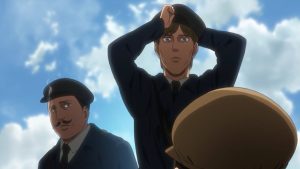 It’s still not really possible to get at why all this is so wrong, so offensive, without spoiling things that haven’t happened in the anime yet. I mean, to me it’s incomprehensible that it should even be an open question that Isayama has taken things in a misguided and nauseating direction, but clearly it is. So that’s frustrating, but it is what it is. On that score I’ll just leave it at what I said in the comments last week, which I think is the absolute limit of how far I can safely go based on where the anime is: anyone who tries to reduce this to a black and white of “it’s either pro-nazi anti-semitic propaganda or it’s 100% fine” is totally missing the fucking point.
It’s still not really possible to get at why all this is so wrong, so offensive, without spoiling things that haven’t happened in the anime yet. I mean, to me it’s incomprehensible that it should even be an open question that Isayama has taken things in a misguided and nauseating direction, but clearly it is. So that’s frustrating, but it is what it is. On that score I’ll just leave it at what I said in the comments last week, which I think is the absolute limit of how far I can safely go based on where the anime is: anyone who tries to reduce this to a black and white of “it’s either pro-nazi anti-semitic propaganda or it’s 100% fine” is totally missing the fucking point.
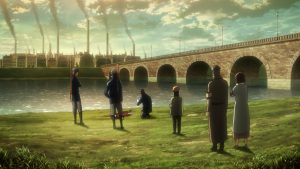 OK, onto the episode itself then, to the extent that it matters. Two names finally see the light of day – Marley and Eldia. You know who the Marleyans are and who the Eldians are – if you pretend otherwise you’re just being obtuse. Eldia former great power, through their first royal gained titan power, ruled the known world. Practiced eugenics and all sorts of bad things, were overthrown by Marley 80 years ago and the King fled to the island of Paradis and built the three walls. Some of his people were left behind in ghettos and forced to wear armbands and are treated like sub-human monsters. Grisha is one of them.
OK, onto the episode itself then, to the extent that it matters. Two names finally see the light of day – Marley and Eldia. You know who the Marleyans are and who the Eldians are – if you pretend otherwise you’re just being obtuse. Eldia former great power, through their first royal gained titan power, ruled the known world. Practiced eugenics and all sorts of bad things, were overthrown by Marley 80 years ago and the King fled to the island of Paradis and built the three walls. Some of his people were left behind in ghettos and forced to wear armbands and are treated like sub-human monsters. Grisha is one of them.
Or so the official history says, the first part anyway. Grisha and his fellow revolutionaries certainly didn’t believe it. But that’s for another time.
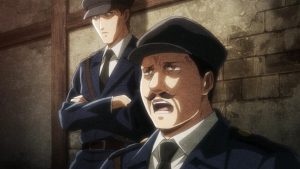 The implications for the plot and characters of Shingeki no Kyoujin are, in the words of Q, both subtle and gross. But again, there’s only so much conversation that can happen based on what’s been shown in the anime and what hasn’t. One can piece together the various fragments Isayama has laid out and have a pretty good picture of the who, what and where (though the why is a bit more complicated). To the extent that one can have the plot itself and what Isayama is trying to say with it remain distinct I will, but that gets harder and harder to do as more puzzle pieces are slotted into place.
The implications for the plot and characters of Shingeki no Kyoujin are, in the words of Q, both subtle and gross. But again, there’s only so much conversation that can happen based on what’s been shown in the anime and what hasn’t. One can piece together the various fragments Isayama has laid out and have a pretty good picture of the who, what and where (though the why is a bit more complicated). To the extent that one can have the plot itself and what Isayama is trying to say with it remain distinct I will, but that gets harder and harder to do as more puzzle pieces are slotted into place.
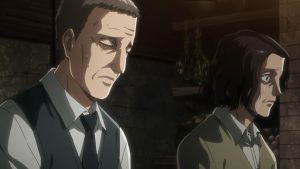 As for comments, I’ll keep it pretty simple. No manga spoilers, period (that’s easy part). Keep it civil, and I ain’t kidding. Disagree – with me or other posters – fine. If you read the 40-odd comments attached to last week’s post you know which ones managed to stay inside the guardrails and which didn’t. I’m not going to let this devolve into some reddit shitstorm like the manga comments did at this point – no way. So if you don’t think that works for you, that’s fine – just leave the road clear for other drivers who feel differently.
As for comments, I’ll keep it pretty simple. No manga spoilers, period (that’s easy part). Keep it civil, and I ain’t kidding. Disagree – with me or other posters – fine. If you read the 40-odd comments attached to last week’s post you know which ones managed to stay inside the guardrails and which didn’t. I’m not going to let this devolve into some reddit shitstorm like the manga comments did at this point – no way. So if you don’t think that works for you, that’s fine – just leave the road clear for other drivers who feel differently.


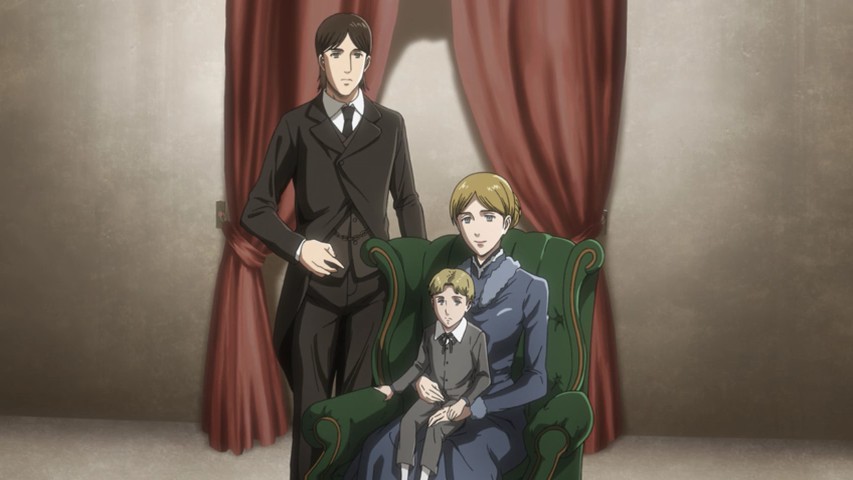
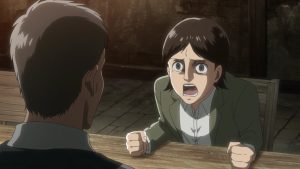
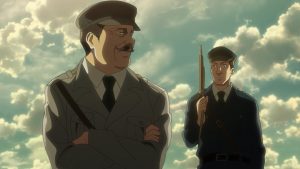
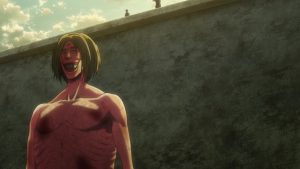
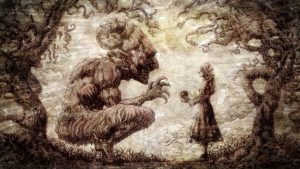
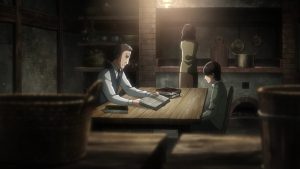
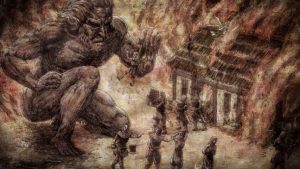
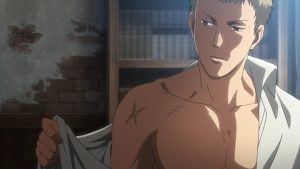
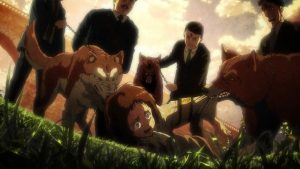
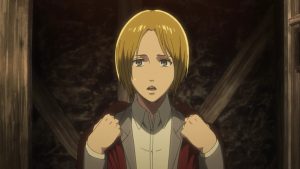
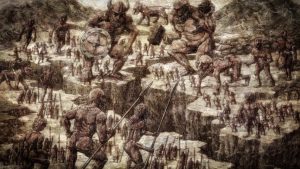
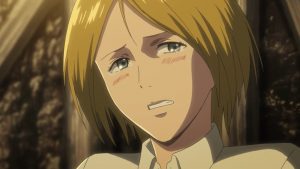
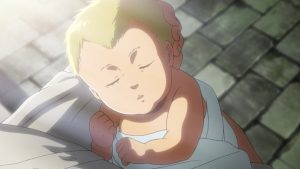
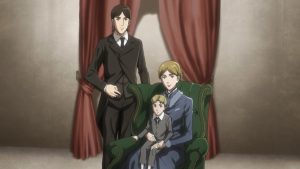
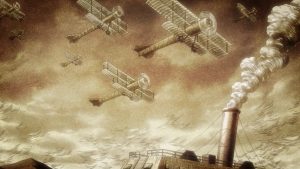
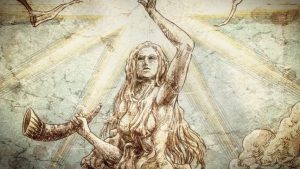
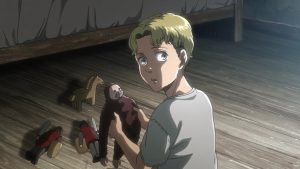
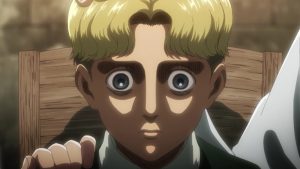
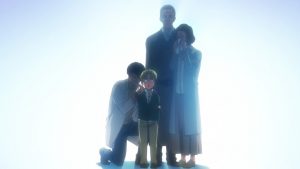
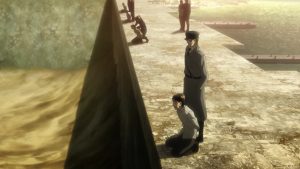

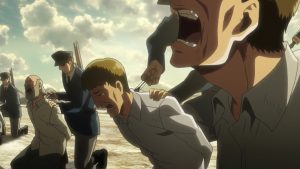
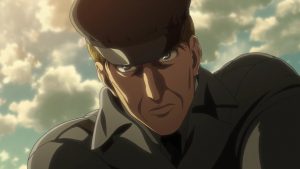
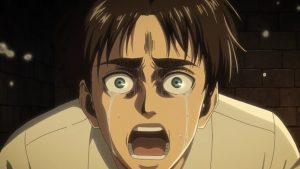
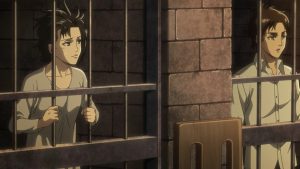

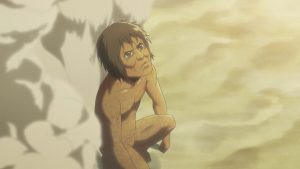

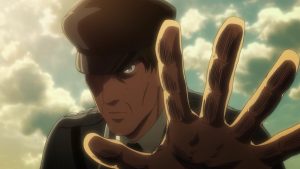
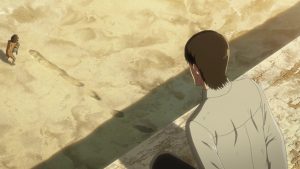
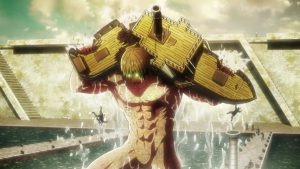
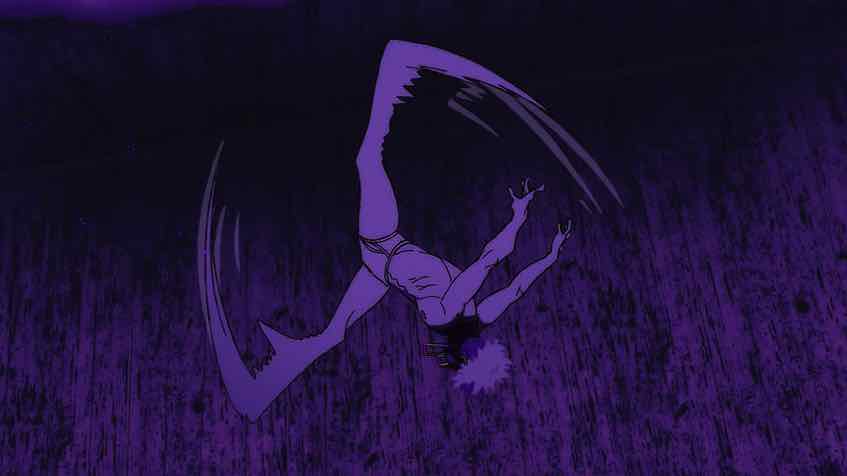
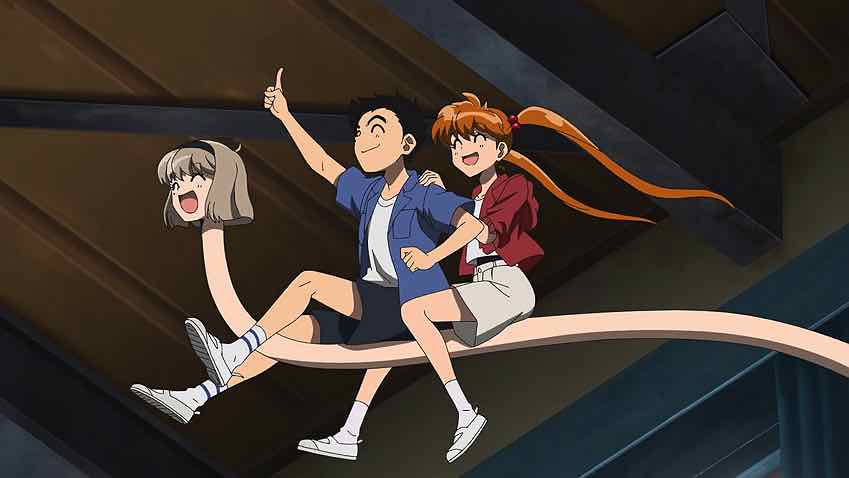
Simone
June 17, 2019 at 10:09 pm“anyone who tries to reduce this to a black and white of “it’s either pro-nazi anti-semitic propaganda or it’s 100% fine” is totally missing the fucking point”
I don’t think I get what the point is supposed to be though. That Shingeki no Kyojin is in general a series that embraces a right wing mindset and a militarist aesthetic is pretty easy to argue. Whatever the ultimate aims of Isayama, this still is at the very least an extremely dour portrayal of human nature, with the sort of “dog eat dog” mindset that can easily justify nationalism on a pragmatic, if not an ideological, basis. Personally I argue against the notion of it being antisemitic not because I think it’s not possible for it to be politically questionable in general, but because the Eldians-Jews comparison really seems skin deep to me. There can only be so many divergence points before a comparison stops being a comparison at all. But also, to consider it an unflattering comparison one would have to think that the Eldians we’re shown in this episode are any less innocent than the Jews persecuted by Nazis were, and I don’t think they are at all. Both sides were perfectly innocent. It doesn’t make a difference that the Eldians’ ancestors in theory had a world-spanning, and rather oppressive, Empire, and the Jews were prosecuted for most of their history. At an individual level, the current Eldians are perfectly innocent of anything their forefathers might have done, yet still are being made to pay for it. To intern them isn’t any more fair than it would be to intern Italians over the conquests of Julius Caesar.
And yes, there’s the “latent ability to turn into Titans” thing that tips the balance, potentially. But that is the same trope that we see in many “superpowered minority as stand-in for real victims of discrimination” settings, like the X-Men. Namely, the difference with reality being that these people *truly* have the potential to be dangerous, while real victims of discrimination are otherwise perfectly normal human beings. But in that sense X-Men are much more outrageous because some of them are indeed capable of mass destruction, while individual Eldians by comparison are absolutely inoffensive, as they need an injection of Titan serum to transform. Destroy all the serum, problem solved, Eldians are like every other human being. So I can’t see this latent power as a mark of infamy. It’s just a neutral thing.
Ultimately I think the gap of lack of understanding that you perceive (and frustrates you) is due to this fundamental difference in how people connect with the same tropes or story on display. Personally, neither watching this episode nor reading the manga I have ever felt that there was an intent different from eliciting sympathy for the common Eldians and their plight. If anything, the Eldians appear to me like a metaphor for the post-WW2 Japanese, so the political implications might be troubling for entirely different reasons.
Then again, this is all about authorial intent. There’s then the matter of how much he managed to convey, or what message do people take from it, which is another entirely. We can’t read his mind, but it’s a fact that a lot of different outlooks exist on this story, and very few that I’ve seen end up with thinking that racial discrimination is a good thing. Depending on your position on Death of the Author, that may or may not matter. Personally I think intent matters, because an author whose intent doesn’t come through just isn’t very good at their job, and sometimes people’s personal readings can be so absurdly removed from the subject matter that it’s like they watched a different story (I once had a very surreal discussion with someone who thought Sorry To Bother You was a satire of socialism, not capitalism). But intent matters only so far; there’s a story about Ray Bradbury meaning his “Fahrenheit 451” to convey the message TV IS BAD, but practically no one ever read it that way, and good thing too, because that was a pretty stupid message.
Guardian Enzo
June 17, 2019 at 10:43 pmMuch of Isayama’s audience being insufficiently familiar with history to understand why what he’s doing is offensive doesn’t make it any less offensive. And I think to say that the Eldians are a “metaphor for post-WW II Japanese” is unbelievably naive, obtuse or both. The only way Isayama could have intended it that way himself is if he were unbelievably naive – and this guy is not naive.
You can’t view what is very obviously intended to be a historical metaphor in a vacuum as some random piece of plot. It doesn’t work that way. And – in my opinion – you can’t make a statement like “It doesn’t make any difference what the Eldians’ ancestors did” unless you conveniently disregard two thousand years of anti-Semitic tropes repeated and repeated throughout European history from the time of the Romans onward. Maybe Isayama thought because of who and where he was he could get away with it, and to an extent he has – largely thanks to the disconnect most of his paying audience has with 20th-Century history. But that’s not my problem – the context matters as far as I’m concerned.
Simone
June 17, 2019 at 11:01 pm“And I think to say that the Eldians are a “metaphor for post-WW II Japanese” is unbelievably naive, obtuse or both.”
Why would that be the case? It all fits. The Eldians were an imperialistic country. They were defeated and punished for their crimes, and confined to an island, deprived of their conquests and possibilities to make more, and had a sovereign put above them that enforces pacifism. And now, they’re just oh-so-oppressed by the evil foreigners, you know, basically as oppressed as the Jews were during the Holocaust, when all they want is a bit of, ahem, “vital space”…
It all fits. It’s a far more typical take you’d expect from a Japanese nationalist. Lots of victim complex and some revanchism.
“You can’t view what is very obviously intended to be a historical metaphor in a vacuum as some random piece of plot.”
No one is denying the Ghettos are an obvious Holocaust reference. The question is whether the similitude is meant to carry beyond that. Basically, whether it’s supposed to be a deep analogy, or just Godwin’s Law at work. The Holocaust has become, in the collective unconscious, THE image of reference for genocide and ethnic discrimination, not unlike Nazi uniforms have become that for authoritarianism, which is why you get such a similar aesthetic in things like Star Wars’ Imperials (or recently, the First Order). Almost every dystopian story about an authoritarian regime will borrow some imagery from one or the other thing.
“And – in my opinion – you can’t make a statement like “It doesn’t make any difference what the Eldians’ ancestors did” unless you conveniently disregard two thousand years of anti-Semitic tropes repeated and repeated throughout European history from the time of the Romans onward.”
I don’t see that as strong evidence either. There’s nothing in the specifics of what the Eldians did that harkens back to those anti-Semitic tropes. A lot of them were either specifically tied with Christian mythology or involved secret societies trying to take over the world or just being rich and stingy. Eldia sounds like a pretty standard empire that took over the world by force. More Romans than Jews. There’s some supernatural nonsense about Ymir and the Titans but ultimately the opposing viewpoints seem to be “they oppressed and enslaved!” vs. “they built infrastructure and civilised!” which is every colonialist empire ever. And again, even if – what then? Do you think the narrative is trying to say “Eldians are like Jews; yes, now they are not guilty, BUT their ancestors actually did evil shit”? I don’t see that. It doesn’t fit or square with anything else in the story, I don’t see a reason nor a context for it, and it doesn’t match with the fact that Eldians are portrayed mostly as the good guys and the whole *point* is that it’s unjust to treat them like this because of long past history. That’s the exact opposite of the standard “sins of the fathers” mentality that originally motivated antisemitism, since the original fault of the Jews was, well, supposedly killing Jesus. You keep saying as if it’s all so blatant and you’d have to just be blind or in bad faith to not see it, but I think you’re simply underestimating how much of this take is a product of your personal way of reading the same imagery.
Simone
June 17, 2019 at 11:08 pmAlso, about this:
“Much of Isayama’s audience being insufficiently familiar with history to understand why what he’s doing is offensive doesn’t make it any less offensive.”
True, if it is, but it still lessens the impact a whole lot. Offences or propaganda only matter as much as they get received by others and affect them. It’s a bit of a “if a tree falls in a forest where no one can hear it, does it make a sound?” situation. If Isayama’s offensiveness is so arcane and subtly expressed that no one gets it… it’s not all that offensive, though not for Isayama’s merits.
Orion Taylor
June 17, 2019 at 11:22 pmI really can’t shake the feeling that you are some sort of philosophy grad student or postdoc.
Simone
June 18, 2019 at 12:42 amLol XD. I’ve got a doctorate, but it’s in physics, not philosophy.
Cancer777
June 18, 2019 at 12:51 amI’m not sure what I should be outraged about.
Hear me out.
I had no previous knowledge of the controversy for this series. Heard some rumbling about nationalism and tought it might be about some Japan war crimes and figure I’ll learn about them eventually but that does not seem to be the case.
Then there were obviously all the German names and most characters are very white and very blond and a use very specific military salute and I thought oh these guys are supposed to be Nazis, hell Mikasa being Japanese and being a “superpowered ally” made sense. But then I remembered sometimes Japanese authors use aesthetics just because they look cool and foreign. Like the million shows with Christian / catholic aesthetics that could be misinterpreted and making fun (maybe they are?) of that religion.
Then the ones I thought were nazis were segregated, had armbands to denote their ancestry and had fricking stars on them… “subtle”. So now the ones I tought were nazis turn out be an allegory for Jews? So, I guess Eren and co are oppressed Jews fighting the nazi oppressors… and this is… bad?
The only way I can make sense of this controversy is if the Eren and co are nazis (or at least descendants of nazis) and that Jews used the same tactics that nazis used on jews during ww2 (the armbands). Sort of implying that Nazis are good guys fighting the oppression of jews. This is obviously a good reason to be mad about.
I tried googling to learn more, but everyone seems to be mad about different things. Some say that Eren and co are a Jewish allegory and because they can become mindless killers (titans) it’s an insult… but again that means the Jewish are the heroes of the story. Others claim that the problem is that by simply depicting nazi symbolism the series is an insult to all Jews, which I won’t agree or disagree, but then there are many other media that should get the same treatment.
Perhaps I’m simply not understanding some other subtle hints? I’m neither white nor Asian and my country did not participate on the “world wars” so maybe this disconnect is why I’m a bit perplexed on why I should be outraged.
And just to be clear, Nazis bad, that’s not up for debate.
Stöt
June 18, 2019 at 1:03 amJust had a huge argument on how Erwin (Rommel?) was a genius, and how Isayama was the god of subtleties. Unreal. I am not going to bother with this series much more, but I just want to write some final remarks:
In the end, I persevered through these episodes because the foreshadowing of this reveal has been very well made. Season 2 bored me to bits (so much filler, so many re-caps!) but the ED suggested that there was something thought out, a genesis of the saga that would make everything make sense. What we got was some nazi-apologetic bullshit, and the purpose of the Survey corp is no more.
When a fascist writer creates a problem, the only solution his protagonists see is to hammer it down, no cost being too great. That’s what we’ve gotten for 57 straight episodes and it’s not that interesting. Not when the losses are now meaningless. And the Eldian king who decided not to fight but retreat is portrayed as weak and a betrayer of his people. Of course.
And finally something worth repeating: All this about Eldians only having themselves to blame, is exactly what was being said about the jews at the time. Can you guys not see how this nazi-apologetic shit is offensive?
Fanhunter
June 18, 2019 at 3:25 amFirst of all, that bit of “When a fascist writer creates a problem, the only solution his protagonists see is to hammer it down, no cost being too great” is a load of bull, I can tell you dozens of works that follow that scheme of handling that problem (name any Shonen with Hotblooded Determinators as characters and you will get one) , and I am pretty sure that not everyone is a fascist. Plus if you read the work that served of inspiration for this manga, Muv Luv Alternative, you can see hat scheme, the only way of fighting against the Beta is to be willing of sacrifice everything they had and a little more in the hope that your sacrifice will be worth it.
And about, “All this about Eldians only having themselves to blame, is exactly what was being said about the jews at the time” do you realize that the guy who tells that is a fucker who feed a little girl to the literal dogs, no? If that is the message that you are getting out of this, I am sorry but I am getting the exact opposite.
Simone
June 18, 2019 at 5:32 am“All this about Eldians only having themselves to blame, is exactly what was being said about the jews at the time. Can you guys not see how this nazi-apologetic shit is offensive?”
I mean… it’s said by the blatant card-carrying villains who kill little girls and feed them to the dogs. As you mentioned, Isayama isn’t exactly the god of subtlety. I wouldn’t take that sort of statement at face value. What are the bad guys *supposed* to say, if not evil shit?
BLZ231
June 18, 2019 at 2:40 am“Anyone who tries to reduce this to a black and white of ‘it’s either pro-Nazi anti-Semitic propaganda or it’s 100% fine’ is totally missing the fucking point.”
What is the point though? You’re acting like it’s obvious what the problem is, but it’s really not. Whoever or whatever the Eldians are supposed to represent or be a metaphor for, they have been consistently portrayed in a sympathetic light throughout the entire story. Hell, almost all of the characters are Eldian. The only way I could see this being offensive would be if it was implied, implicitly or explicitly, that the Eldian people deserve what’s happening to them because of what their ancestors did. But that has clearly not been the case, in fact it’s been the exact opposite. And that’s assuming that the Marleyan propaganda about the Eldian empire being pure evil is true, which they’ve already hinted probably isn’t.
You say that the anime hasn’t yet revealed why this turn in the story is so offensive. But I’m caught up with the manga, and I still cannot see anything that offensive or problematic. Sure, there are some characters who have troubling and extreme plans, but I don’t see the story in any way endorsing or approving of those plans, and the different characters have been at odds about what they should do. So could you maybe stop beating around the bush and just tell us what the problem is?
blargnobia
June 18, 2019 at 3:59 amI remember being kinda happy when we got to this part in the manga, since Isayama did actual world-building instead of going with some horrid YA-novel plot twist.
I was afraid when the characters made it outside the walls a scientist would show up and say, “oh yeah there was some kind of apocalypse/viral outbreak/whatever and we tried to avoid it using titans but it didn’t work so we locked you behind the walls. Also it was all a social experiment to see how you’d react. Grad students, amirite?”
In retrospect, I think I’d prefer the YA plot twist.
Guardian Enzo
June 18, 2019 at 6:16 amAnd the tenor of much of the debate is what happens when fans treat a sinister bit of social propaganda as if it were a YA plot twist.
Nadavu
June 18, 2019 at 7:12 amNever watched an episode of Shingeki no Kyoujin, but I’ve been enjoying the comment section quite a lot lately.
Guardian Enzo
June 18, 2019 at 7:28 amI’m glad my misery is entertaining somebody, ROFL.
BLZ231
June 18, 2019 at 12:10 pm“Sinister bit of social propaganda”
Oi! What propaganda are you even talking about? As I said, almost all of the characters in Attack on Titan are Eldian, and the Eldians have been portrayed in a sympathetic light from the very start. I don’t see anything in the story that excuses or justifies anti-semetism or any other kind of prejudice, and in fact it has done the exact opposite. And unless you can actually show how the story condones or encourages any kind of real world prejudice, you just look like someone who is determined to be offended over nothing. And if you dismiss what I have to say by declaring me to be a troll, then that will prove that you’re not really interested in having a discussion.
I’ve seen several comments here that go into great detail about why the way Eldians are portrayed here isn’t offensive or problematic, and why the overall narrative and themes of Attack on Titan are clearly against the kind of prejudice and propaganda you seem to be worried about. Aren’t you going to address or even acknowledge what they have to say? Or are you just going to stubbornly stick to your preconceived ideas without actually backing them up?
Guardian Enzo
June 18, 2019 at 1:27 pmStudy history more.
I’ve already responded in as much detail as I can at this point in the adaptation. Basically, the gist of the defense of Isayama seems to follow this pattern:
As I stated earlier, Isayama may have been counting on the fact that many (or most) of his readers/viewers know little about the Holocaust. We’ve seen the rising fetishism of Nazis and general fascists in LNs and anime, so he figured he’d probably find a receptive audience. And in a practical sense, his guesses have been validated by the results. But that doesn’t make what he’s doing here any less noxious.
This whole “there’s good and bad on both sides” fantasy is in many ways even more insidious and dangerous than abject, transparent white supremacy and fascism. Blaming the Jews for the supposed sins of their ancestors has been a justification for atrocities committed against them since long before the Holocaust which Isayama reproduces here. The Catholic Church didn’t officially disavow the teaching that the Jews are collectively responsible for the death of Jesus until 1965, and even afterwards it’s still a widely-taught dictum by conservative Catholic and other Christian groups. To ignore all that and treat this series as if it exists in a vacuum is laughable.
This whole response reminds me of a baby who hides their eyes and assumes that they must therefore be invisible. Ignorance of history does not nullify history. And when we’re dealing with a rise of nationalism generally and very specifically among anime fans, actively playing into that worldview using WW II history as a template is incredibly dangerous. As I said earlier Isayama would have to be incredibly naive to think that his true intentions here wouldn’t be apparent, and he’s not naive. He knows exactly what he’s doing.
There’s plenty more coming in the story, believe me – the surface has just been scratched. As blatant as what we’ve already seen is I know that’s hard to believe, but Isayama doubles down on this misguided bet over and over. That part is off limits for the moment for reasons of plot, unfortunately.
LGrey
June 18, 2019 at 1:54 pmTwo episodes left in this season. Will we, anime viewers, see the ‘unforgivable offensive stuff’ you’ve been mentioning by then? Or is it more likely to be shown in the next season?
Guardian Enzo
June 18, 2019 at 2:07 pmMuch of it won’t be till next season. But TBH to me Isayama has already shown his hands to a large degree. If you’re fine with things so far, who know – maybe that won’t change.
Kamyu03
June 19, 2019 at 12:10 amCorrect me if i’m wrong but it seems i’m starting to grasp the issue in question, what many find so offensive (and rightfully so), has something to do with a implicit attempt at moral equivalence between the parties? I’d like to elaborate on why i’m getting this “feeling” though of course it might not be sole issue here.
Kim
June 19, 2019 at 7:05 amNormally I hate spoilers but I really wish I had been spoiled about this awful twist a long time ago. Yes I was an anime only watcher who somehow missed what was coming.
*A*
June 19, 2019 at 7:14 amI honestly loved this episode. The cycle of hatred produces more hatred. Sometimes ‘learning from history’ is a curse.
*A*
June 19, 2019 at 11:06 pmMy other post got eaten by the spam filter T^T.
Maybe because I included a link?
Anyway, I wanted to say that it would be interesting to see people’s reactions to the original Gundam if it aired today. The allegory of Zeon=Nazis is quite strong (Google ‘Zeon flag’, ‘Sieg Zeon’ etc.) YET there is no black and white in the world of Gundam. Both the Federation and Zeon committed war atrocities and also both are portrayed as victims.
*A*
June 19, 2019 at 11:07 pmAnd here’s another interesting discussion: https://www.reddit.com/r/ShingekiNoKyojin/comments/c1s3gg/new_episode_spoilers_the_attack_on_titan
TheVainVulture
June 20, 2019 at 2:00 pmI cannot argue without spoilers but I would like to know about your take on other popular anime like Naruto. The main characters basically are child soldiers and they are glorified for their heroics/ crimes. Does that mean that the author encourages such ideas? I’m just confused where to draw the line here.
Guardian Enzo
June 20, 2019 at 3:16 pmWell I can’t comment on Naruto specifically as I’m not a fan. But there’s no one general line – it’s a case by case basis. For me (and many others) SnK crosses several of them. I’ve stated why in great detail. Others feel differently – that’s fine. No one is saying it shouldn’t exist – but it shouldn’t be above criticism either.
Simone
June 20, 2019 at 5:15 pmNaruto IMHO fails hard in a thematic sense, but not because it feels fascistic, rather because it simply kinda forgets its own original themes. It starts off with a world where we have child soldiers, true, but it’s not painted as a *good* world. The Leaf is the most progressive village, and that simply means they don’t do shit like forcing their own kids to fight to the death as a graduation exam. At the beginning it’s made clear that Naruto wants to change things; he speaks about “his own ninja way” and rejects the reality of war. Kakashi too says that “in the ninja world, those who break the rules are scum, but those who abandon their friends are worse than scum”, planting the potential seed of dissent. Naruto is supposed to upset the world in a big way as an underdog who wants to become the highest figure in the village.
And then it all ends up in nothing as there’s a big ninja war where everyone goes pew pew against Ninja Gendo Ikari and his Instrumentality plan and Naruto turns out to have a bajillion heritages and prophecies behind him or something. Though he *does* seem to bring some reform to the village, it’s nothing radical, and well, he could foster a new era of peace, but then we couldn’t have Boruto. So basically the setup was potentially that of a story about pacifism, it just kinda forgot to ever become one.
But politically, among the big shonens, I always thought Naruto is more right-wing and One Piece is more left-wing. Naruto after all celebrates a certain attachment to tradition and established order, even with some cautious reformism. One Piece is literally about a bunch of anarchists doing whatever the fuck they want because AMAB (All Marines Are Bastards). I mean, it’s not THAT black and white either, I’m kidding, but you get the picture, in general I’d say One Piece is far less respectful of authority. Though the notion of the ‘King’s Will’ is almost Randian in its conceit, so I guess I could write a “Is Eiichiro Oda an AnCap?” thinkpiece.
*A*
June 21, 2019 at 3:55 amI think many people simply bend themselves over to reach their desired conclusion about a work. I don’t think Kishimoto even gave so much thought to possible implications of Naruto. Ninjas are cool. Historically they happened to be assassins and spies? Let’s think of a way of incorporating this into the story! Does the fact that Goku’s hair turns blond when he powers up mean that Dragon Ball is promoting the ‘Aryan master race’ propaganda? I mean, overanalysisng fiction for laughs can be fun (I love how a certain blog went to impossible lengths to present ‘Queen’s Blade’ as a pioneering feminist manifesto, but it was all done tongue-in-cheek: http://blog.draggle.org/colloqium-queens-blade-rebellion-2-3-a-study-in-cultural-anthropology), but if you are 100% playing it straight, then prepare to be hit by people with actual experience in literary criticism.